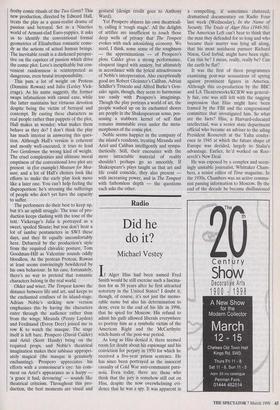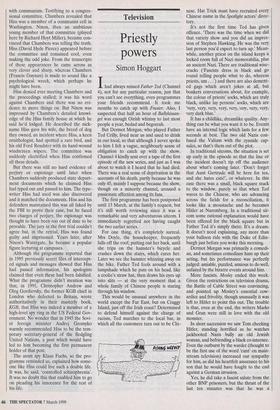Radio
Did he do it?
Michael Vestey
If Alger Hiss had been named Fred Smith would he still exercise such a fascina- tion for us 50 years after he first attracted notoriety in the United States? I doubt it, though, of course, it's not just the memo- rable name but also his determination to deny, even to the end of his life in 1996, that he spied for Moscow. His refusal to admit his guilt allowed liberals everywhere to portray him as a symbolic victim of the American Right and the McCarthyite witch-hunts of the post-war period.
As long as Hiss denied it, there seemed room for doubt about his espionage and his conviction for perjury in 1950 for which he received a five-year prison sentence. He has since been portrayed as the innocent casualty of Cold War anti-communist para- noia. Even today, there are those who think that the jury is somehow still out on Hiss, despite the now overwhelming evi- dence that he was a spy. It was apparent in a compelling, if sometimes cluttered, dramatised documentary on Radio Four last week (Wednesday), In the Name of Security, The Trials of Alger Hiss (1948-50). The American Left can't bear to think that the man they defended for so long and who became their martyr was lying all along, that his most assiduous pursuer Richard Nixon, God forbid, might have been right. Can this be? I mean, really, really be? Can the earth be flat?
It was the first of three programmes examining post-war accusations of spying against prominent figures in America. Although this co-production by the BBC and LA TheatreworksfKCRW was general- ly fair, one was still left with the nagging impression that Hiss might have been framed by the FBI and the congressional committee that investigated him. So what are the facts? Hiss, a Harvard-educated intellectual, was a senior state department official who became an adviser to the ailing President Roosevelt at the Yalta confer- ence in 1945 at which the future shape of Europe was decided, largely to Stalin's advantage. Earlier, he'd worked on Roo- sevelt's New Deal.
He was exposed by a complex and seem- ingly unstable journalist, Whittaker Cham- bers, a senior editor of Time magazine. In the 1930s, Chambers was an active commu- nist passing information to Moscow. By the end of the decade he became disillusioned with communism. Testifying to a congres- sional committee, Chambers revealed that Hiss was a member of a communist cell in Washington. Nixon, then an ambitious young member of that committee (played here by Richard Hoyt Miller), became con- vinced that Chambers was telling the truth. Hiss (David Hyde Pierce) appeared before the committee and remained cool, even making the odd joke. From the transcripts of these appearances he came across as very clever and sharp, whereas Chambers (Francis Guynan) is made to sound like a psychological wreck, which perhaps he might have been.
Hiss denied ever meeting Chambers and the proceedings stalled; it was his word against Chambers and there was no evi- dence to move things on. But Nixon was impressed by Chambers's detailed knowl- edge of the Hiss family house at which he said he'd lodged. He described the nick- name Hiss gave his wife, the breed of dog they owned, an incident where Hiss, a keen ornithologist, had spotted a rare bird, and his old Ford Roadster with its hand-wound windscreen wipers. The committee was suddenly electrified when Hiss confirmed all these details.
But there was still no hard evidence of perjury or espionage until later when Chambers suddenly produced state depart- ment documents which he claimed Hiss had typed out and passed to him. The type- writer Hiss had used was also discovered and it matched the documents. Hiss and his defenders maintained this was all faked by the FBI to prove their case, but he faced two charges of perjury, the espionage was thought to have been too out of date to be provable. The jury in the first trial couldn't agree but, in the retrial, Hiss was found guilty and imprisoned. Years later, after Nixon's Watergate, he became a popular figure lecturing at campuses.
Although the programme reported that in 1995 previously secret files of intercept- ed signals and messages showed that Hiss had passed information, his apologists claimed that even these had been falsified. What the programme didn't mention was that, in 1991, Christopher Andrew and Oleg Gordievsky, the former KGB chief in London who defected to Britain, wrote authoritatively in their masterly book, KGB, that Hiss was indeed a member of a high-level spy ring in the US Federal Gov- ernment. No wonder that in 1945 the Sovi- et foreign minister Andrej Gromyko warmly recommended Hiss to be the tem- porary secretary-general of the fledgling United Nations, a post which would have led to him becoming the first permanent holder of that post.
The atom spy Klaus Fuchs, so the pro- gramme reminded us, explained how some- one like Hiss could live such a double life. It was, he said, 'controlled schizophrenia'. It was no doubt this that enabled him to go on pleading his innocence for the rest of his life.



























































 Previous page
Previous page